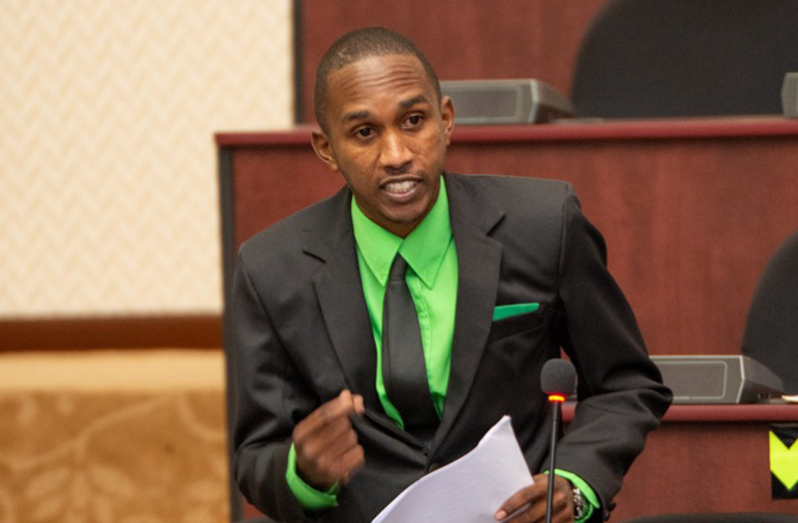—more resignations expected, reliable sources confirm
THERE continues to be clear indications of discontent and internal struggles within the People’s National Congress/Reform (PNC/R), with the latest blow to the party being the resignation of its Chairman, Shurwayne Holder, who also served as parliamentarian from 2020-2025.
His resignation comes just one day after veteran Executive Member, Mervyn Williams, cut ties with the party on his live programme, Nation Watch. The Guyana Chronicle understands that more resignations are expected to follow in the coming days.
While neither Williams nor Holder offered specific reasons for their resignations, the Guyana Chronicle understands that the internal tension in the party grew after the announcement of businessman, Terrence Campbell, as the lead parliamentarian for the PNC/R-led A Partnership for National Unity (APNU) coalition.
APNU’s recent announcement of its 12 parliamentary picks sparked debate, as controversial Working People’s Alliance (WPA) figure Dr. David Hinds also made the cut, while key figures such as former Chief Whip Christopher Jones; Attorney-at-Law, Roysdale Forde; former APNU+AFC minister, Annette Ferguson, among others, were left out.
Dr Hinds, known for his provocative commentary on race and politics, has drawn ire for using terms like “lick bottom” to insult African Guyanese who support the People’s Progressive Party/Civic (PPP/C).
Earlier this year, Hinds opened the programme by insulting the dignity of Afro-Guyanese. He hurled a series of grotesque insults, such as referring to them as “lick bottoms” and “house slaves.”
There have also been criticisms about the absence of youth in the parliamentary list. While the list has left many raising questions regarding long-standing members being omitted and newcomer Campbell being the party’s lead Member of Parliament (MP) over APNU executives, APNU Chairman Aubrey Norton, on Friday, said it requires no public explanation.
During a virtual press conference, Norton publicly said he will not be heading to parliament nor seeking presidency in the future. At the press conference, which was prior to the resignations, Norton also said his focus is to “rebuild” the party.
APNU’s lead MP businessman Campbell, was the Alliance For Change’s (AFC)’s pick for presidential candidate had there been a new coalition ahead of the 2025 election.
Campbell had said he would “break the hands” of Norton [make him concede to the terms] during the negotiations on a possible APNU+AFC coalition.
Just last year, Campbell publicly lambasted Norton’s leadership and declared the opposition coalition process “untenable.”
Aside from Campbell, the other APNU parliamentarians are Juretha Fernandes, Ganesh Mahipaul, Dr. Hinds, Sharma Solomon, Vinceroy Jordan, Nima Flue-Bess, Saiku Andrews, Coretta McDonald, Riaz Rupnarain, Dexter Todd, and Sherod Duncan.
With the list of parliamentarians announced, Norton, who has stepped aside, said: “I will preside over the party and ensure that I put the mechanism in place so that by the time we arrive at the next elections, we are well structured, we will be ready and the new blood in the party will take over the party. I hope that is an indication that I have no intention of running for the presidency in the future.”
Norton, ran as the APNU’s presidential candidate in this year’s elections and was the former opposition leader.
The results of the September 1 2025, General and Regional Elections not only showed that APNU lost the election to the PPP/C, but also lost a majority of its support base to political newcomer, We Invest in Nationhood (WIN).
The WIN party is set to become the main opposition. It will have 16 seats to fill based on the official results released by the Guyana Elections Commission (GECOM).
In the last parliament, the APNU and AFC held 31 seats in the National Assembly, forming the main parliamentary opposition, with 22 of those seats being held by APNU members.
Meanwhile, former APNU parliamentarian Amanza Walton-Desir’s party, Forward Guyana Movement (FGM), picked up one seat at the 2025 elections.
Six political parties contested the polls this year, but the PPP/C’s strong showing across the ten administrative regions has solidified its mandate to govern for an additional five years.
Based on the results, the PPP/C will be returning to office with a substantial parliamentary majority having secured 36 of the 65 seats.



.jpg)








